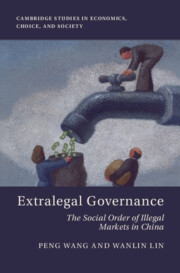Refine search
Actions for selected content:
2 results

Extralegal Governance
- The Social Order of Illegal Markets in China
-
- Published online:
- 21 November 2025
- Print publication:
- 25 September 2025
1 - Introduction
-
- Book:
- Extralegal Governance
- Published online:
- 21 November 2025
- Print publication:
- 25 September 2025, pp 1-15
-
- Chapter
- Export citation
